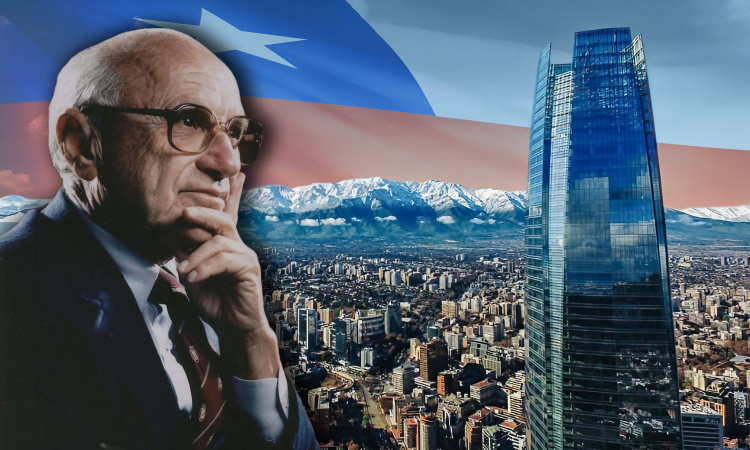Chile has for two decades been Latin America’s leading nation for development. The top ranked nation on the UN Human Development Index since 2013, Chile had a score of 0.819 out of one in 2022 and was 40th globally.
Seeking to revive former President Salvador Allende’s Marxist political project, however, the left has disseminated a fake narrative.
The documentary Chicago Boys (2015), directed by Chileans Carola Fuentes and Rafael Valdeavellano, shows the education journey of the so-called Chicago Boys. In the film, Chicago Boys Sergio de Castro, Ernesto Fontaine, and Rolf Lüders tell their story and discuss their role during the Augusto Pinochet dictatorship (1973–1990).
Coined due to their graduate studies at the University of Chicago, the “Chicago Boys” term became popular after Pinochet’s economic reforms. Proposed by the Chicago Boys, these reforms generated a flourishing economic model and swift turnaround from inflation and shortages.
The documentary, however, disregards the latter. Instead, Chicago Boys discusses the morality of a model created under an autocratic government that commited systematic human-rights violations.
The Chicago Boys’ Origins
During the Cold War, from 1953 to 1956, the US government donated around $13 million to Latin American universities to directly influence the region’s higher education. In 1955, Chile’s Catholic University and the University of Chicago signed an agreement for Chilean undergraduates to study for a master’s degree in economics in Chicago. After completion, students had to return to Chile, where they made a long-lasting contribution to development.
Some of the professors that taught Chilean students included Nobel of Economics recipients Milton Friedman, Theodore Schultz, and Ronald Coase. Once back in Chile, the Chicago Boys became professors at the Catholic University and taught the importance of free-market economies to the rising generations.
By 1970, the Chicago Boys handed over an economic plan to President Jorge Alessandri. Running for reelection against Allende, Alessandri rejected the plan and called it radical. Allende, who pledged during his campaign to establish “the Chilean way of socialism,” won the election with the Marxist Popular Unity Party.
With its Cuba 2.0, the Allende regime plunged Chile into a deep inflationary, economic, political, and institutional crisis. As reported by Congress in August 1973, Allende was also perpetrating multiple violations of the constitution, which led to the Armed Forces’ decision to remove the incumbent administration.
While ignoring Allende’s constitutional infringements, the documentary thoroughly explains how some economic and political elites supported the coup of a “democratic” government.
The Era of Reforms
In 1972, Chilean former Commander Roberto Kelly asked the Chicago Boys for an economic plan for Chile’s restructuring. De Castro considered the proposal “an academic exercise.”
Using the plan presented to Alessandri as a starting point, de Castro and his team wrote the so-called brick policies. Based on the principles of classical liberalism—free market, privatization, macroeconomic stability, inflation control, and trade openness—the bricks sought to overcome the crisis and boost economic growth through foreign investment.
The Chicago Boys invited Milton Friedman to visit Chile in 1975. During his stay, Friedman met Pinochet and conveyed to him the benefits of a free-market economy and its relation to political stability.
Despite popular belief, Friedman was never an adviser to the dictatorship. However, he sent Pinochet a letter regarding the country’s economic situation. Pinochet requested the letter.
After Friedman’s visit, the Chileans that obtained their master’s degrees at the University of Chicago occupied the Economy Ministry and put in place the brick policies. Friedman called this event the “Chilean miracle.” He later said the real miracle was not the outstanding results of the economic policies but the fact that a centralized, military regime allowed free-market reforms, which implies decentralization of the economy.
This era of reforms helped Chile become the biggest case of economic and social success in the region. The documentary, however, subtly suggests the economic development was a myth.
A Country in Stand By
The documentary criticizes the implementation of a “radical neoliberal system”—as Ricardo French-Davis, a dissident Chicago Boy, described it—and the fact it was implemented under a dictatorship. Since the dictatorship is responsible for thousands of extrajudicial killings, the Chicago Boys are often considered to be passive accomplices.
According to the National Truth Commission, there were 2,279 victims of political violence between 1973 and 1990. One has to be emphatic when condemning the human-rights violations perpetrated by the regime. However, they do not refute the positive impact of the Chicago Boys’ economic reforms.
First, the military regime voluntarily transitioned to a democracy through elections. Further, Chile’s poverty rate decreased from 50 percent in 1975 to less than 8 percent in 2014.
Since 2019, after October’s strikes and the arrival of a pro-Allende president (Gabriel Boric), Chile has experienced multiple setbacks: inflation, criminality, and unemployment. Axel Kaiser, who holds a PhD in philosophy, warned about this in 2007 with his books The Chile That Is Coming and The Fatal Ignorance.
In The Chile that Is Coming, he wrote: “In today’s Chile, there is a fake sensation of security. Many believe it is impossible to have social outbreaks. Or even military officers on the streets. Some even believe we are firmly moving towards development.”
Chile’s Marxists have tried to undermine the model that has helped the country lead in terms of prosperity and development across the region. However, the Republican Party—a classical-liberal-leaning party—won the election for the Constitutional Council in May 2023. This victory grants them the opportunity to write a new constitution that erases Pinochet’s negative legacy but honors the Chicago Boys, creators of the Chilean miracle.
 Join us in our mission to foster positive relations between the United States and Latin America through independent journalism.
Join us in our mission to foster positive relations between the United States and Latin America through independent journalism.
As we improve our quality and deepen our coverage, we wish to make the Impunity Observer financially sustainable and reader-oriented. In return, we ask that you show your support in the form of subscriptions.
Non-subscribers can read up to six articles per month. Subscribe here.

